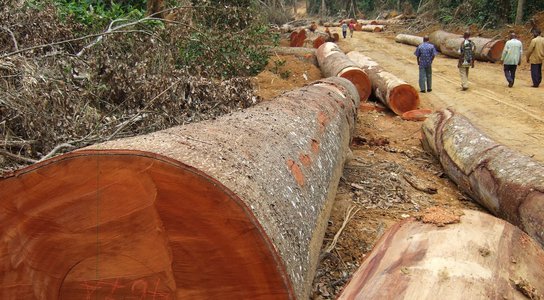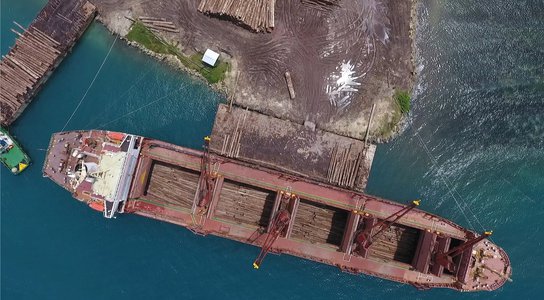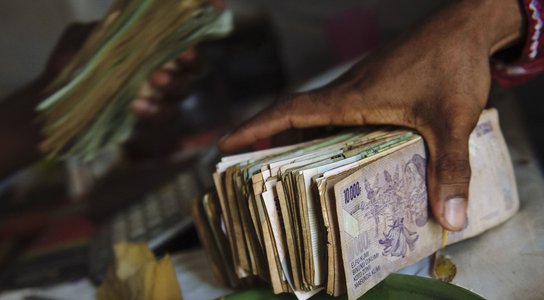A notorious Congolese army officer illegally traded timber licences in Democratic Republic of Congo (DRC) in the run-up to disputed presidential elections at the end of last year, Global Witness reveals today.
General Gabriel Amisi Kumba (known as “Tango Four”), sanctioned by the EU and US for human rights abuses, is a powerful figure in DRC and a close ally of former President Joseph Kabila, raising concerns that he used his influence to sidestep the law in his acquisition and subsequent sale of logging permits.
Amisi’s family obtained five logging concessions in June 2018, in contravention of DRC’s longstanding moratorium on the allocation of industrial logging concessions, which was intended to protect the country’s biodiverse and environmentally-critical rainforests.
The DRC’s Minister of Environment had confiscated these licences from other logging companies without warning, before transferring them to Amisi’s family-held company, Maniema Union 2.
The cancellation of the licences and their allocation to Maniema Union 2 occurred within four days. Within weeks, the Amisi family sold the company and its licences on to Lei Hua Zhang, a Chinese timber magnate who is an owner of a sizeable but mysterious logging company operating in DRC.
Peter Jones, Campaign Leader, Global Witness said, “General Amisi, a powerful Kabila regime insider, appears to have managed to acquire and sell on logging licences at record speed, even though obtaining new licences was illegal at the time.
“This raises fears that Congolese elites close to power have been able to flout environmental regulations to make money, potentially lining the pockets of politically-connected individuals at the expense of the Congolese treasury and the country’s forests. This is especially worrisome as DRC’s controversial elections appear to have resulted in a coalition arrangement that allows Kabila to remain highly influential in DRC politics despite not having stood for president,” added Jones.
This is not Amisi’s first foray into DRC’s lucrative trade in natural resources. The General has long been accused – by the UN, among others – of involvement in illegal mining and arms trading.
In addition, Amisi has a track record of involvement in
human rights abuses. He was sanctioned in 2016 by the
EU and the US
for his alleged role overseeing the deadly suppression of pro-democracy
demonstrations in Kinshasa as Congolese citizens protested against delays to
presidential elections that were originally supposed to be held in 2016. In the
wake of these events and international sanctions, Amisi was promoted
by Kabila.
Global Witness wrote to General Amisi and contacted his lawyer by telephone, but did not receive a substantive response.
Kabila’s
reign was characterised by widespread mismanagement and corruption, especially
in DRC’s lucrative timber and mining sectors. Amisi’s quick-fire acquisition
and sale of logging permits is another example of a failure to uphold the law
in the timber sector and the opacity around the trade in DRC’s forests.
Evidence of a deeply opaque logging sector
Lei Hua Zhang acquired Amisi’s permits by buying Maniema Union 2, which was held at the time by Amisi’s wife and children. Company records show that the General managed several of the children’s holdings as they were too young to do so themselves. Documents seen by Global Witness show that Amisi’s wife continued to manage Maniema Union 2’s logging concessions several months after she relinquished her shares in the company.
Mr Zhang is the chairman of Wan Peng International, a major Chinese timber, shipping and cement conglomerate active across Africa and Asia. Wan Peng appears to have extensive logging and timber trading operations in DRC, however almost no trace of the company exists on official records for DRC’s timber sector or export records seen by Global Witness. The company claims that in 2015 it purchased 1.09 million hectares of virgin forest in DRC, but the concessions were not visible on the Environment Ministry’s online map of concessions holders at the time Global Witness went to press.
Its recent activities in the region show that Mr Zhang's company, Wan Peng, is also not shy of going into business with politically-connected figures. In 2017, Wan Peng purchased an 80 percent share of Christelle SARL, a timber company belonging to Kelly Christelle Sassou Nguesso, the daughter of Denis Sassou Nguesso, President of neighbouring Republic of Congo.
“The patchy information around Wan Peng’s DRC logging operations
is reflective of an opaque sector more broadly,” said Jones. “It’s vital that the
country’s timber sector is run transparently so that logging activities in one
of the world’s most climate-critical forests do not carry on without any
effective oversight, as the results would be devastating.”
In response to questions from Global Witness about Wan
Peng’s business in DRC, including links to Amisi, a spokesman said that our
enquiries pertained to trade secrets and that they were not at liberty to
disclose any information.
What the DRC Environment Ministry has said, and what it must do now
Despite a legal obligation to do so, the DRC Environment Ministry has yet to publish any information on the licence holders of the concessions linked to Maniema Union 2. It has also failed to publish copies of any Maniema Union 2 logging contracts online. This opacity around logging in DRC creates a risk that illegally harvested timber can be sold on the global market, as buyers will be unable to independently verify who owns the concessions from which their purchases are sourced, a key requirement for effective due diligence when buying timber.
The new DRC government should immediately revoke all concessions allocated in violation of its moratorium and publish all details of concession owners and contracts. The international community, which provides some funding for the DRC Environment Ministry, should ensure that transparency initiatives are genuinely enacted by the institutions they are funding and demand all illegal logging concessions are cancelled and returned to the State. International timber traders purchasing timber originating from DRC must conduct in-depth due diligence to ensure that they are not purchasing timber sourced from illegally allocated concessions or linked to sanctioned individuals.
/ ENDS
Contacts
Notes to editor:
- Joseph Kabila was President of DRC for 18 years. He came to power after his father was assassinated in 2001 and went on to win two disputed elections in 2006 and 2011. DRC’s constitution limits presidents to two five-year terms, meaning Kabila was obliged to step down in 2016. However he repeatedly delayed elections, raising fears that he planned to stay in power in violation of the constitution. Eventually, in December 2018, presidential elections took place and Felix Tshisekedi was declared the victor. Tshisekedi replaced Kabila in DRC’s first peaceful transition of power, however the official election result was rejected by the Catholic Church, which had deployed a team of 40,000 election observers to monitor voting. A noted academic observer described the result as “the first election rigged by the government in favour of an opposition candidate”. Tshisekedi does not have a majority in parliament and as a result is forming a coalition government with Kabila’s FCC party, whereby Kabila and his allies appear likely to retain significant influence over key ministries and institutions.
- Global Witness has campaigned for the protection of climate critical forests in DRC for over 10 years. We have also advocated for the proper enforcement of the European Union Timber Regulations with regards to Congolese timber. Our report Total Systems Failure revealed systemic issues in the management of DRC’s logging sector, showing how the biggest single owner of logging concessions was operating illegally on 90 percent of its sites. Our recent briefing Buyers Beware shows how EU companies could be importing millions of Euros worth of illegal Congolese timber. Another recent briefing shows that due to no regulatory control over illegal timber imports, China is exposed to systematic risk of illegal timber imports.
- Major General Gabriel Amisi Kumba (Tango Four) occupies the second most powerful post in DRC’s military. He has been accused by the UN Group of Experts for DRC of arming rebel groups and poachers, and of being involved in illegally mining gold. He was sanctioned by the US and EU in 2016 for his role in the violent suppression of pro-democracy demonstrations in Kinshasa.
- DRC’s Environment Ministry produces, in conjunction with the World Resources Institute (WRI), an online map of logging concessions and owners, but the map seems to contain errors and omissions. A similar map, produced in September 2018 by the Agedufor project, a multimillion-Euro forest management scheme funded by the Agence Française de Développement, also lacks vital information on the identities of licence holders for several concessions, including one that seems to be linked to Maniema Union 2. In many cases, rather than provide the name of a licence-holder, the map simply states “contract signed”. It is not clear how Agedufor was able to ascertain that a contract had been signed without knowing the identity of the concession holder. If Agedufor does have the name of the licence holder, it is unclear why it cannot disclose this information. The five concessions awarded to Maniema Union 2 in June 2018 appear on the map under the names of their previous owners, despite the fact that the map was labelled as having been produced in September 2018, three months after the allocation to Maniema Union 2.
You might also like
-
Briefing Buyers Beware
Ten European traders could be importing illegal Congo timber worth millions, breaking the EUTR and damaging climate-critical rainforests.
-
Briefing Lessons from China’s global forest footprint
There’s a high risk that the top ten countries China imports tropical timber from are supplying illegal timber – will it step up and play a lead role in tackling the issue?
-
Briefing Omate
How a senior Congolese army officer receives a major slice of gold production from a mining company with consent of a court